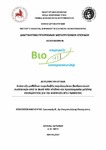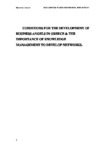| dc.creator | Polyzos, S. | en |
| dc.creator | Minetos, D. | en |
| dc.creator | Niavis, S. | en |
| dc.date.accessioned | 2015-11-23T10:45:54Z | |
| dc.date.available | 2015-11-23T10:45:54Z | |
| dc.date.issued | 2013 | |
| dc.identifier.issn | 20653913 | |
| dc.identifier.uri | http://hdl.handle.net/11615/32394 | |
| dc.description.abstract | This paper aims at describing urban sprawl driven land use changes during the last decades in Greece as well as analyzing the major regional and economic development implications. Particular attention is given to the analysis of possible driving forces with economic and social origin that contribute to the sprawl of urban forms in the suburbs and into the countryside. We employ an ordinal regression model in order to investigate the likely driving factors of urban sprawl across NUTS-III municipalities in Greece. Ordinal regression is a variation of ordinary regression which is used when the dependent variable is categorical and the explanatory variables are continuous or categorical ones. The results of the empirical analysis bring up some important issues relevant to the theoretical framework of the study. The degrees of influence of the individual factors as well as their level of significance vary considerably. Accessibility, informal housing practices, direct population potential and the existence of coastal natural resources seem to fuel urban sprawl. Overall, we think that this empirical research can provide decision-makers with important information concerning the major factors which influence urban sprawl. In the context of planning a sustainable regional development policy the major driving factors and the spatial patterns generated by urban phenomena such as urban sprawl and illegal housing are of crucial importance. Urban sprawl phenomenon has hardly been analyzed at the regional level in Greece. Most existing studies focus on the periphery of great metropolitan areas. Yet, an overview of urban sprawl patterns at a broader scale can give valuable information on the basic trends of the phenomenon across the country and uncover certain spatial differences in the magnitude of sprawl between locations. | en |
| dc.source | Theoretical and Empirical Researches in Urban Management | en |
| dc.source.uri | http://www.scopus.com/inward/record.url?eid=2-s2.0-84874207329&partnerID=40&md5=8ad31c03150ff1eff6b4c03bf8d726f3 | |
| dc.subject | Informal Housing | en |
| dc.subject | Land Use Change | en |
| dc.subject | Ordinal Regression | en |
| dc.subject | Urban Sprawl | en |
| dc.subject | development strategy | en |
| dc.subject | economic development | en |
| dc.subject | empirical analysis | en |
| dc.subject | informal settlement | en |
| dc.subject | metropolitan area | en |
| dc.subject | regional development | en |
| dc.subject | regression analysis | en |
| dc.subject | suburban area | en |
| dc.subject | sustainable development | en |
| dc.subject | urban development | en |
| dc.subject | urban housing | en |
| dc.subject | Greece | en |
| dc.title | Driving factors and empirical analysis of urban sprawl in Greece | en |
| dc.type | journalArticle | en |




